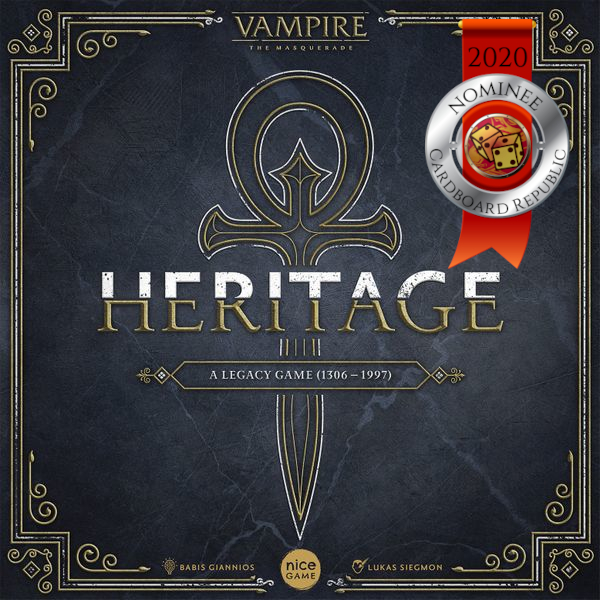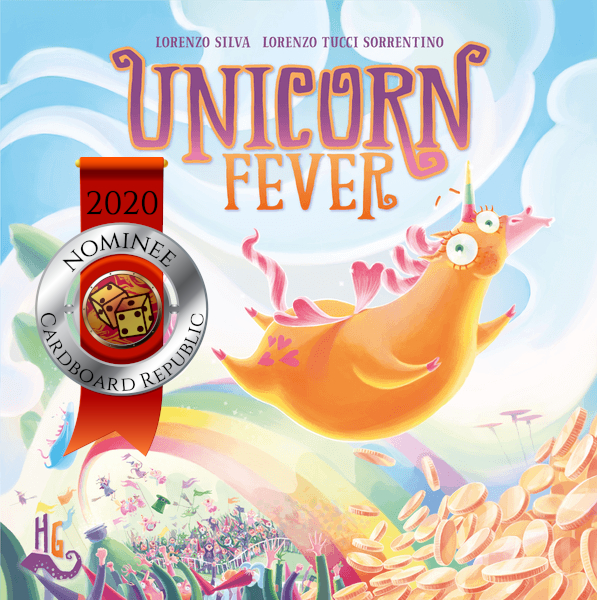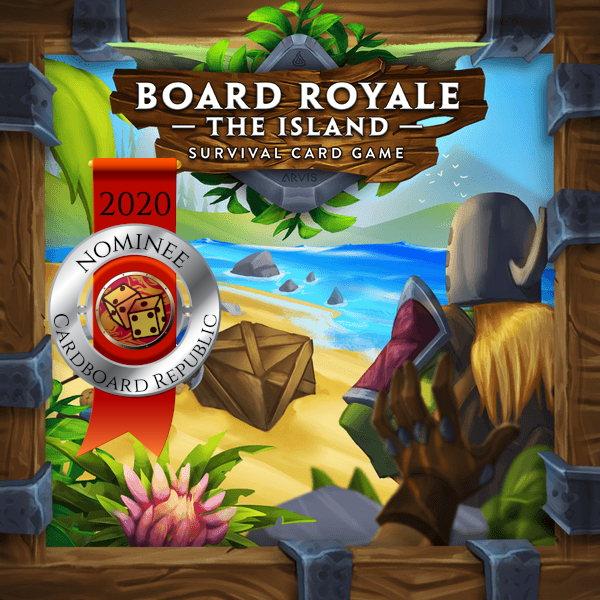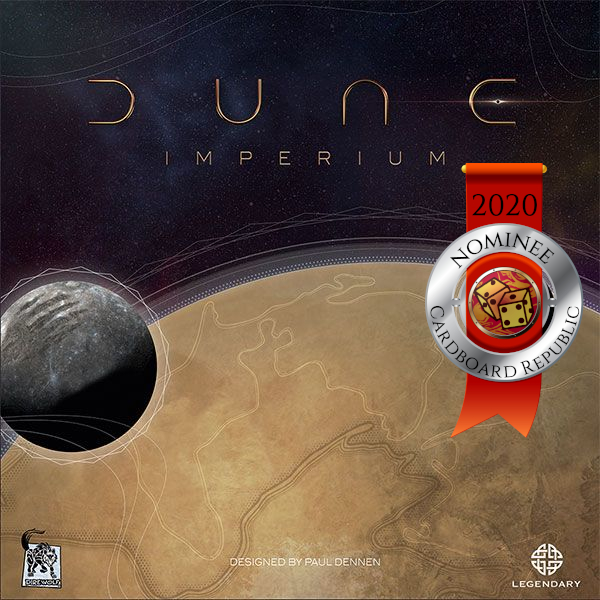The Cardboard Republic has rolled out the annual Laurels of the Republic awards, celebrating the best new games released in 2020 for each of the gamer archetypes. What follows are the finalists for one of those groups.
 Always the penultimate gamblers, Daredevils like living on the edge. This group adheres to the idea of high risk and high reward, never letting a silly thing like failure get in their way of possible victory – or a good time. That said, this group doesn’t avoid or dislike strategy either. Rather, they’re just far more willing to take chances for a better payoff, be it on the battlefield or the board room. Essentially, Daredevils like to win, but they want to do it on their terms. They adore games giving them a wide variety of options to cross the finish line, and if they have to embrace a bit of luck to accomplish that, then so be it!
Always the penultimate gamblers, Daredevils like living on the edge. This group adheres to the idea of high risk and high reward, never letting a silly thing like failure get in their way of possible victory – or a good time. That said, this group doesn’t avoid or dislike strategy either. Rather, they’re just far more willing to take chances for a better payoff, be it on the battlefield or the board room. Essentially, Daredevils like to win, but they want to do it on their terms. They adore games giving them a wide variety of options to cross the finish line, and if they have to embrace a bit of luck to accomplish that, then so be it!
And with that, here are The 2020 Laurel Finalists for Daredevils:
Honorable Mention: Flyin’ Goblin
Publisher: IELLO | Players: 2-4 | Play Time: 30 Minutes
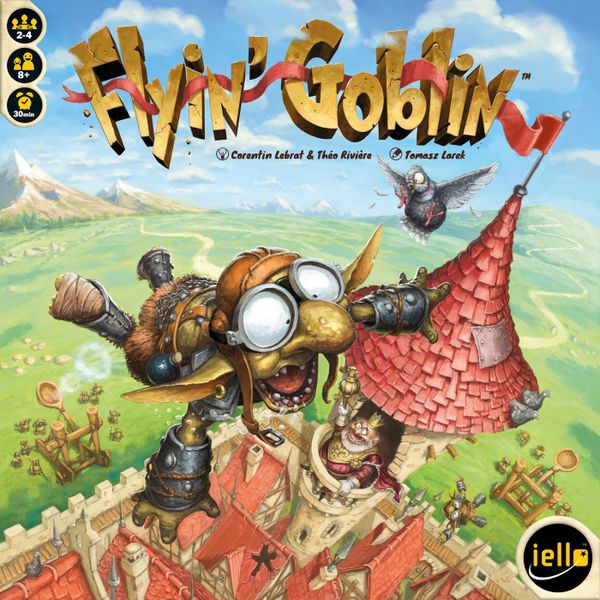
Of all six archetypes, Daredevils and the games they cater to were disproportionately affected by the unique gaming difficulties of 2020. For a player category that leans into unpredictability, risk-taking, and a hearty appreciation of the unknown as part of their gaming enjoyment – intrinsic qualities that many were actively trying to downplay or avoid given the circumstances of the pandemic – they had to overcome not just logistical hardships but affective ones as well. There were also fewer such titles than usual last year due to more than a few publishers holding releases until 2021 in part due to those reasons. In all, 2020 made it particularly challenging for this group and the style of games they enjoy most to flourish.
Still, given that adaptability is in their ludographic genes, there still were plenty of meritorious titles of the last year for them to fling themselves into.
Literally, in the case of Flyin’ Goblin.
Easily the most whimsical game mentioned here, Flyin’ Goblin is a quick and energetic free-for-all foray into heisting treasure. In this dexterity-driven setting each player is a clan of goblins laying siege to the king’s castle in their quest for shiny objects. Over a series of simultaneous turns, players utilize their goblins for what they’re best suited – as cannon fodder – to physically catapult them over the walls of the game’s box-as-board layout and have them either land in various chambered rooms (which can have either positive or negative effects), or topple various objects stacked above them. While objectively the goal is to be first to acquire a set number of diamonds from the castle, gold may also be obtained to recruit additional goblins or assemble a clan totem in the scaffolding above. Completing your totem can also win you the game…assuming your rivals don’t keep knocking it down first.
Like many dexterity games, Flyin’ Goblins is one part mild strategy and two parts flinging yourself into the mayhem just to see what happens. This approachable and lighthearted incursion offers both via its ribald atmosphere and irreverent charm. With a zany premise and unpredictable outcomes galore, Flyin’ Goblins allows for victory through focused, targeted launches or merely lobbing your clansmen over with wild abandon; both are viable options. For Daredevils, who take as much interest in victory as the path taken to get there, this is one lightweight game they’ll consider a treasure either way.
The Nominees

Number Five: Vampire: The Masquerade – Heritage
Publisher: Nice Game Publishing | Players: 2-4 | Play Time: 45-90 Minutes
In most mediums that highlight and celebrate gothic fiction and urban fantasy, one particular creature of the night looms large in the otherworldly spotlight: the vampire. For centuries tales of the vampire have been at the forefront of gothic literature, cinema, and pop culture, ranging from twisted undead revenants, to suave and sophisticated socialites, to teenage sparkle machines. While boasting a spectacular breadth and depth of creative material, there nevertheless is little argument as to who standard-bearer of the genre is.
The same is not true within board gaming, where the vampire is generally either relegated to part of an ensemble cast or present only in an abstracted manner.
One major exception is the massively popular and ever-expanding World of Darkness series. Over the last 30 years (and more than a few publishers), the goth-punk styled World of Darkness has spread beyond its tabletop RPG roots to include card games, board games, LARPS, comics, video games, novels, and even a short-lived TV show. At the not-so-beating heart of it all, however, remains the vampire and their eternal struggle within themselves, with each other, and the world writ large.
With Paradox Interactive at the helm, the last two years have seen the release of several new games set in this dynamic and richly-developed world. Among them is Vampire: The Masquerade – Heritage, an engaging legacy game of area control and political manipulation.
Set over a campaign span of 700 years and thematically reflecting different points in time, each playthrough of Heritage largely works the same way. In it, players take turns drafting new vampires to their clan, working towards various hidden agendas, and attempting to ensure the factions your undead coteries are aligned with control the various battleground locations at game’s end. With fairly concise rules and sessions often about an hour, each clash in Heritage is an appreciably concise and constantly changing tug of war where your actions and machinations directly impact the outcome.
Yet what makes Heritage especially appealing to Daredevils is its legacy elements. Here you truly feel your actions add further intrigue by permanently altering the effects of characters, challenges, and game rules depending not just on whether you win or lose, but simply through the choices that you make. To this group seeing the result of seven centuries of tinkering, be it calculated or capricious, is a willful adventure simply too enthralling to pass up.
Number Four: Unicorn Fever
Publisher: Horrible Guild / Luma Games | Players: 2-6 | Play Time: 45 Minutes
In most instances evoking mention of a unicorn returns a very specific image. Graceful. Magical. Mystical. Aloof. They are the embodiment of purity and an avatar of goodness in the world. To merely steal a glance at their countenance is considered a reward unto itself, their serene essence radiating all around them…
These are not those kinds of unicorns. Instead, the unicorns of Unicorn Fever are irrationally and instinctually drawn to run along a rainbow whenever one forms, putting the unicorns of this world much closer to a magic-infused Golden Retriever or a coked-out My Little Pony.
They simply cannot resist.
In a normal fantasy land, such an unfettered but ultimately harmless act would occur without incident. But given that the players are denizens of a magical community that would feel right at home in a Shrek sequel, you decide to take advantage of the situation by betting on – and manipulating – the outcome of these races.
Beyond swapping the 1930’s noir styled horseracing theme of 2009’s Horse Fever for a brighter and slightly sillier motif befitting the game’s antics, everything around the race itself was completely redesigned, streamlining player choices while increasing their ability to make bets and influence the race itself. The desire to win through any means, however, is still firmly in place – albeit with more tongue-in-cheek humor.
During each of the game’s four races, players perform a handful of actions prior to the unicorns bolting over those colorful arches in the clouds. These include playing magic cards to manipulate specific unicorns, contracting with underworld creatures for special abilities, and above all, placing bets on who you think will win or place. Races themselves are controlled by a deck of randomized movement cards, giving the game a true sense of unbridled unpredictability. Winners collect their bounty in gold and glory points, with the most glory determining the overall winner.
Unicorn Fever’s major appeal, especially with Daredevils, is the reality that while there’s ample opportunities to sway the odds and make decisions based on the actions of other players (thereby preventing it from being a total luck fest), between everyone’s combined mucking about and an inherent unknown to the races under ideal circumstances, there’s zero guarantees your machinations will give you the result you desire. It is a game whose entertainment value comes both from trying to be cunning in your actions but also sitting back and seeing just how sideways everyone’s plans go. To this group, odds are good they’ll find such a prospect fittingly irresistible.
Number Three: Board Royale: The Island
Publisher: Arvis Games | Players: 2-6 | Play Time: 30-60 Minutes
“Does anyone have any spare wood for trade? I want to craft that harpoon gun.”
“What do I get out of it?”
“A gold. And I promise not to shoot you with it.”
“Hmm…Yeah, I’m ok with that.”
This is the setting for Board Royale, a fast-paced, cutthroat, and ridiculous card game with one basic, overarching notion: do whatever it takes to be the last one standing on an uninhabited, lawless island. For as the as the name of the game itself alludes to – only one person is making it off alive.
Think Lord of the Flies without the redeeming allegory, or if Highlander had been set in Aruba.
Over a number of turns players will draw resources cards. Resources are an all-important locus of the game as the cards in your hand are not only used to construct available items and fuel various weapons – they also double as your hit points. Run out of cards, and you’re fish food.
Beyond that, what you do with your turn is largely up to you, with several possibilities including building one of the randomly revealed item cards, be they defensive trinkets, usable weaponry, or passive escape cards which allow you to automatically escape the island (and therefore win) should you get enough of them. Of course, since all items are public, such crafting also could make you a pretty target. So, tread carefully. Attacking players forces them to discard cards. Eliminating them lets you collect whatever they possess.
You’re also able to make all manner of freewheeling deals and trades in Board Royale, including resources, items, promises, loans, Faustian bargains, forced concessions – you get the idea. Whatever works to get the job done, really, which the game certainly encourages. But even then, there’s no guarantees.
With a staggering amount of player agency, a fair amount of luck, a modicum of Munchkin-esque insanity, and plenty of comedic moments based around whether or not your in-the-moment machinations pan out of fail spectacularly, Board Royale is a frenetic clash of survival that is quick, brutal, and completely unpredictable. Yet Board Royale doesn’t lament its zany, unstable game state: it relishes it. For Daredevils, who seek out risk rather than eschew it and who value games where the journey is as rewarding, if not more so, than the outcome, this R-rated 3 Hour Tour is exactly the kind of free-for-all they’ll happily get stranded for.
Number Two: Dune: Imperium
Publisher: Dire Wolf | Players: 1-4 | Play Time: 60-120 Minutes
It’s not much of a stretch in saying that Frank Herbert’s creative, expansive, and highly influential Dune series is to science fiction what Tolkien is to fantasy, inspiring decades of subsequent writers and filmmakers to construct imaginative space-faring universes of their own. His impact on the genre is inescapable, as evidenced by the fact that more than 50 years on its mesmeric appeal is as prevalent as ever. Otherwise we wouldn’t be here championing one of the several new Dune-themed board games leading up to the newest film adaptation coming out later this year.
In the galaxy-spanning Dune series, all roads lead to the unassuming desert world Arrakis and its all-important spice. For he who controls the spice controls the fate of civilization.
It is through this vantage where Dune: Imperium drops its players: a world where political control and influence shift as often as the sands. Of all the titles on this list, Imperium made the biggest splash in 2020. Part of this is due to the coincidental fact that it’s the only one of the five that didn’t come via a Kickstarter. But a larger part is thanks to its captivating theme and the appreciable way the game infuses that theme with its familiar-yet-clever mechanics.
Principally, Dune: Imperium is a hybridization between a worker placement game and a deckbuilder. Over the span of several rounds, players act as the heads of the major noble houses as they jockey on the board for available resource locations, with the cards in your hand stipulating the locations you’re able to visit. Resources – including the precious melange – allow you to access more powerful locations, gain influence with various factions, and recruit troops. Cards not spent on workers are used to obtain better cards or boost your combat strength in the game’s numerous battles. Each focus provides a means to get VP; the first house to 10 takes control of Arrakis…for now.
Thought slightly more abstracted than it first appears, Dune: Imperium effortlessly blends its flavor and assorted mechanics in a way that keeps the game tense but not overly restrictive and fittingly allows players to routinely adjust their gameplan to keep in step with the continually evolving plotting of the competition. As with so many things Dune, risks are abundant but offer no guarantees. With so many moving elements, alongside a dash of luck, Imperium makes it difficult to predict a winner right up to the very end. For Daredevils, Imperium’s freedom of choice, risk/reward options, and extensive strategic malleability make it precisely the kind of conflict they’re willing to wade in to.
So much so, in fact, that once it released we openly wondered if it had a chance at this year’s Laurel. And it likely could have, if not for another space-based game of intrigue and unpredictable outcomes…
The Winner
2020 Daredevil Laurel – Moonrakers
Publisher: IV Games | Players: 1-5 | Play Time: 60-120 Minutes
As is often the case with most Daredevil-based outcomes, we did not see this one coming. Which is rather oh so fitting for the category really when you get down to it. Because the crux of any Daredevil-friendly game is the idea that there is no singular path to victory superior to all others and taking gambles to reach the finish line is very much an asset to the game rather than a detriment.
No game on this list better embodies that ethos than Moonrakers.
In this out of this world negotiation meets deckbuilding title, each player is part of an interstellar mercenary band looking to secure their status as the next leader of the Moonrakers through accomplishing missions and building the necessary prestige.
Though the outcomes will vary wildly not just between playthroughs but even from one attempt to the next, the central flow of the game is fairly straightforward. In it, players take turns trying to accomplish various contracts that yield you money and fame. These contracts require specific assortments of ship capabilities, including shield strength, crew size, engine speed, and energy output. It is through your deckbuilding efforts where you attempt to amass the necessary components.
The thing is, you can’t. For the overwhelming majority of the game, there’s no way in Alpha Centauri that you’re able to accomplish them by yourself. Which means you need to recruit other players into helping you. Which means in Moonrakers you are routinely making temporarily alliances with other players.
Once a contract hits the table, players attempt to haggle and negotiate with one another over who gets to go with you and what exactly their share of the cut will be. Agreements need to be generous enough that they’re willing to assist you but not so stingy that they’ll pass on the offer, or worse, agree but backstab you in the process. It is entirely up to you to decide what’s the most advantageous.
Eventually deck upgrades make such tasks less volatile, but Moonrakers thrives not just on presenting an atmosphere of high risk and high reward but necessitating it. You simply cannot win all by yourself. In fact, it can be down right hazardous to even try.
With a polished presentation, attractive artwork, extensive variety of deck upgrades, and sky-high replayability fueled by opportunism and deal-making, Moonrakers is a well-produced game that provides ample space to forge your own path to victory through gambits, flexibility, and a little guile.
All of which plays into this group’s most ardent gaming preferences and why, deservingly, Moonrakers has earned this group’s Laurel.
![]()
Moonrakers Contest!
We thought about different ways to highlight the how great the winning title of the Daredevil Laurel is. We wanted to do something soaring and unpredictable, but too many of our suggestions proved to be too dangerous, expensive, or would inevitably wind us running afoul of the Royal Canadian Mounted Police…again. (It’s a long story.) Thus, to avoid costly bills, potential prosecution due to “breaking into” the Johnson Space Center, and much to the dismay of Daredevils everywhere, in the end we opted for the most direct approach: providing one lucky winner with the opportunity to enjoy the award-winning game first hand. So let’s get to it!
That’s right! Enter below for your chance at your very own copy of Moonrakers!
Be sure to check out the 2020 Laurel Award pages for the other archetypes once they go live!

